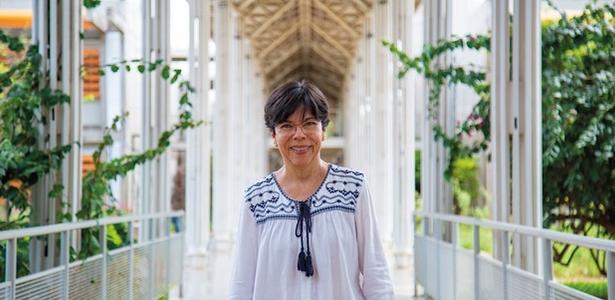Mercedes Bustamante, Professor in the Department of Ecology at the Institute of Biological Sciences of UnB (University of Brasilia) and one of the country’s leading authorities on climate change, has been elected a member of the National Academy of Sciences of the United States.
The Foundation is a private, not-for-profit community of eminent scholars, founded in 1863 by then-US President Abraham Lincoln. About 190 scientists who have been awarded the Nobel Prize have already passed there. A maximum of 120 members can be elected annually – only 30 non-US citizens.
On the Science Web site’s 2020 list of the most cited researchers in scientific work in the world, Bustamante was among the 18 Brazilians featured in the rankings – and she was mentioned among more than seven thousand scientists from more than 60 countries. Although she has an extensive curriculum that she has amassed over her 28 years in the scientific field, the researcher says she did not expect that she would be selected to join the US entity.
“It was really a surprise. The election also takes into account the body of work that has been developed throughout her career. The Academy must have looked at her performance in researching ecological changes in tropical ecosystems such as the Cerrado and the Amazon,” says she, a reference in the Cerrado region. vitality, the All.
For the professor, at a time when there are cuts in resources for research and campaigns of scientific denial in Brazil, her election shows that the knowledge of Brazilian scientists is internationally recognized. “All the projects I’ve done and the works I’ve published have always had many collaborators, from different institutions. Therefore, I think the recognition is for the Brazilian scientific community, especially for researchers working in the field of environmental sciences.”
The world says education is the answer to the spread of fake news during the COVID-19 pandemic. “There are undoubtedly coordinated actions that support denial in Brazil and other countries, but there is still faith in science. However, it is necessary to expand efforts in education and scientific communication at all levels. School is the center of this effort. Children are curious by nature and curiosity is the fuel of science.” Education inside and outside of school should stimulate this curiosity and develop critical thinking.”
“The country cannot afford not to take advantage of our intellectual capacity”
Amid the joy of recognizing all the hard work, Mercedes Bustamante reminds us that it is still necessary to have more women at other scientific levels. The professor notes that Brazilian women, for example, make up half of the country’s population. This thought should be used more.
“As in all fields, the participation of women in science must also be encouraged and expanded. We are already the majority in undergraduate courses in universities. However, it is necessary to advance the participation of women at the most advanced levels of the scientific profession,” he claims.
Diversity in science broadens approaches and insights, and with that we can work on new solutions. All society benefits from gender equality. In the case of science, not opening spaces for women wastes half of our minds, and the state cannot afford not to take advantage of all this potential.
A possibility, adds the professor, who has also helped fight the pandemic. “It is the work of not only scientists and doctors, but also nurses, nursing aides, physiotherapists and many other women. There is a predominance of females in professions that involve caring for people and it is very important to highlight and appreciate that.”
The world appreciates that although Brazil still suffers from an epidemic of gender violence, important progress has been made in this regard. She says that in academia, these developments have also been observed with greater representation of women on committees, in science academies, as speakers at science events and with the recognition of maternity leave in the Lattis curriculum from CNPq (National Council for Scientific and Technological Development). ).
“However, there are still behaviors inherent in some situations that manifest as interruptions to speech, a disregard for technical functions, and a disregard for work capacity.”
Regarding pay and potential differences in values for scholars and scientists, she says there is parity in academia. But there is more to be done. The differences may lie in the opportunities and conditions for young researchers and mothers to be able to strike a satisfactory balance between the two processes,” she says.
“We need a new generation of scientists to help the country meet the great environmental challenges of the coming decades. Science must provide Brazilian society not only with a clear and accurate picture of these challenges, but also a set of options that combine social justice and the environment.”

“Wannabe internet buff. Future teen idol. Hardcore zombie guru. Gamer. Avid creator. Entrepreneur. Bacon ninja.”

